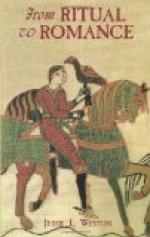In the previous chapter we have seen that there is evidence, and abundant evidence, not merely of the existence of Mysteries connected with the worship of Adonis-Attis, but of the high importance assigned to such Mysteries; at the time of the birth of Christianity they were undoubtedly the most popular and the most influential of the foreign cults adopted by Imperial Rome. In support of this statement I quoted certain passages from Cumont’s Religions Orientales, in which he touches on the subject: here are two other quotations which may well serve as introduction to the evidence we are about to examine. “Researches on the doctrines and practices common to Christianity and the Oriental Mysteries almost invariably go back, beyond the limits of the Roman Empire, to the Hellenized East. It is there we must seek the key of enigmas still unsolved—The essential fact to remember is that the Eastern religions had diffused, first anterior to, then parallel with, Christianity, doctrines which acquired with this latter a universal authority in the decline of the ancient world. The preaching of Asiatic priests prepared in their own despite the triumph of the Church."[1]
But the triumph of the new Faith once assured the organizing, dominating, influence of Imperial Rome speedily came into play. Christianity, originally an Eastern, became a Western, religion, the ‘Mystery’ elements were frowned upon, kinship with pre-Christian faiths ignored, or denied; where the resemblances between the cults proved too striking for either of these methods such resemblances were boldly attributed to the invention of the Father of Lies himself, a cunning snare whereby to deceive unwary souls. Christianity was carefully trimmed, shaped, and forced into an Orthodox mould, and anything that refused to adapt itself to this drastic process became by that very refusal anathema to the righteous.
Small wonder that, under such conditions, the early ages of the Church were marked by a fruitful crop of Heresies, and heresy-hunting became an intellectual pastime in high favour among the strictly orthodox. Among the writers of this period whose works have been preserved Hippolytus, Bishop of Portus in the early years of the third century, was one of the most industrious. He compiled a voluminous treatise, entitled Philosophumena, or The Refutation of all Heresies, of which only one Ms. and that of the fourteenth century, has descended to us. The work was already partially known by quotations, the first Book had been attributed to Origen, and published in the editio princeps of his works. The text originally consisted of ten Books, but of these the first three, and part of the fourth, are missing from the Ms. The Origen text supplies part of the lacuna, but two entire Books, and part of a third are missing.




